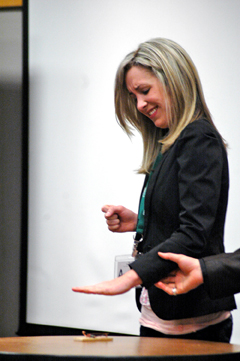Corriveau prepares Kwantlen for emergencies
March 10, 2011 by Steven Maisey · Leave a Comment

Guy Corriveau is Kwantlen's new manager for emergency planning. He has held that position since June 2010. (Photo courtesy of kwantlen.ca)
Guy Corriveau has only been on the job for seven months, but Kwantlen Polytechnic University’s new manager of emergency planning is already bring the university up to speed on emergency planning.
Corriveau is Kwantlen’s first manager of emergency planning, a job he began in June 2010. In the seven months since, Corriveau has been steadily bringing all the Kwantlen campuses into emergency planning by instituting programs, plans and exercises, such as January’s Exercise Shake Out BC.
This is the first time Kwantlen has had an office of emergency planning, and Corriveau says that the university is committed to doing the job right.
The university has set aside money to help Corriveau upgrade communication systems at Kwantlen, to equip Kwantlen with the tools it needs in case of an emergency, as well as giving him flexibility to propose and test different programs, such as volunteer emergency response teams like the ones at BCIT.
Corriveau sets up programs and systems on what he calls his three-by-three-plus-one matrix. This matrix includes reviewing, establishing and implementing evacuation protocols, lockdown protocols and communication issues, along with developing a management structure so those systems can be implemented.
These systems will take time to be put in place, Corriveau said.
“We can’t go into it hastily, we can’t go into it quickly, we have to go into it deliberately, because if you go into in quickly you are likely to make mistakes,” Corriveau said.
Corriveau said that a plan has to be put in place as soon as possible, with as many people involved with the plan as possible to ensure that when an emergency strikes students and faculty will be ready.
One of Corriveau’s goals is to create emergency response teams on every campus at Kwantlen. He says that this approach would put the onus on both students and faculty to get involved in emergency planning. The emergency response teams could be made up of students and staff volunteers. The teams would be trained in light-urban search and rescue, first aid and basic emergency response and recovery.
The purpose of emergency planning at Kwantlen is to create an environment where students and staff can feel safe while they study and work.
“My personal goal is to help Kwantlen achieve a safe and ready learning environment. We need to get to a place where people feel safe being here,” Corriveau said.
Corriveau has the backing of the leadership at Kwantlen and support to invest in emergency planning. The engagement of the leaders at Kwantlen allowed Corriveau to commit Kwantlen to participating in Exercise Shake Out BC, an exercise the organizers estimate 470,000 people participated in.
“I asked senior management if I could commit Kwantlen to participating, and they said yes, and that is the basis of good emergency planning support from leadership,” Corriveau said.
Students surveyed over idea of a shorter semester
March 9, 2011 by Jocelyn Gollner · Leave a Comment
Do students want a shorter semester?
That’s the question that the Office of the Registrar at Kwantlen Polytechnic University is trying to answer.
Robert Hensley, registrar at Kwantlen, sent out an e-mail Feb. 21 asking for students to take a brief survey to determine whether they thought that the semester should be shortened by one week.
Currently, Kwantlen has three 15-week semesters a year (14 weeks of classes and one week of exams). The majority of other postsecondary institutions in B.C. have three 14-week semesters (13 weeks of classes and one week of exams).
Hensley could not be reached for a comment on the issue despite repeated tries.
A representative of the Kwantlen Student Association said that the KSA hasn’t taken a stance on the subject yet. However, she said that Brad Head, director of academics for the KSA, has reserached semester length, and found that people actually do better in shorter semester lengths.
“Some of us believe that it’s not that great, because you’re paying more per week of study essentially. But the short answer is that we don’t have an answer now. We have to develop policy and then council has to approve the policy before we can actually take a stance on something,” the KSA representative said.
The majority of students we talked to seem to be in favour of a shorter semester length.
“I agree with it,” Cisi Zhao, a Kwantlen business student, said. “I think it benefits students, because a lot of students want to go back to their hometown and if the breaks are too short, it’s not good for us.”
Justin Wong also wants a shorter semester.
“My friends that go to other schools are always done before us and it just feels like everyone else is already out there having fun and we’re still stuck in school. It just makes me not want to study,” he said.
Crystal Tang had a different idea about the subject.
She thought that a longer semester is more beneficial because then more detail can be explained in the course and instructors don’t need to rush through the curriculum.
.
Credit cards: it’s no small change
March 9, 2011 by Hayley Woodin · Leave a Comment
If you fancy a bottle of Coke or a sugary snack but don’t have the cash, you can indulge your sweet tooth by adding a buck fifty to your credit card bill. Several vending machines throughout Kwantlen give students the option to swipe their VISA or Mastercard, but that’s a convenience students can’t use when it comes time to pay their tuition.
The school chose to end credit card payment for tuition beginning in the fall 2010 semester, explaining the transaction fees credit companies charge is “quite absorbent,” especially when thousands of students pay their tuition during the same period.
The university has stated that it expects to save $250,000. The money will go to students in the form of scholarships and bursaries.
Kwantlen isn’t the first post-secondary institution to implement the change. Both the University of British Columbia and Simon Fraser University have also stopped accepting credit cards as a method of tuition payment.
On the Kwantlen website, it states that the only things domestic students can’t pay with a credit card are tuition, student fees and KSA fees. Other fees and services are payable with credit.
According to the school, “you can use your VISA or Mastercard for the commitment fee but that’s as far as it goes.”
START hosts bake sale for Heart & Stroke
March 1, 2011 by Matt Law · Leave a Comment

START Volunteers (left to right) Naveen Zafar, Luke Arathoon and Sunita Sohi hope to raise $2,000 for the Heart & Stroke Foundation by holding a cupcake drive. Photo by Matt Law
Bring your toonies to Kwantlen campuses this week — START is hosting a cupcake bake sale to benefit the Heart & Stoke Foundation of BC & Yukon.
The cupcake sale starts Wednesday, March 2, in the rotunda on Richmond campus from 11 a.m.-4 p.m. and moves to the Surrey courtyard on March 3.
Cupcakes cost a minimum donation of $2 and proceeds go to supporting the KUSA START Volunteer Big Bike teams which will ride May, 20 at 4 p.m. and 5 p.m. at Central City in Surrey.
Cupcake sales have become a fairly common sight on Kwantlen campuses and have been used to raise money for everything from graduation events to breast cancer.
This is the first time the START program has run a sale benefiting the Heart & Stoke Foundation said Naveen Zafar, START’s volunteer mentor.
The START Volunteer program was established in 2010 with a goal of connecting Kwantlen students with their community. Zafar and several other volunteers had been involved with the Heart & Stroke Foundation in the past but had never organized anything through Kwantlen.
“The Heart & Stroke Foundation has nothing to do with the bake sale; we are just donating all of the money because we believe it’s a good cause,” said Zafar.
Many of the volunteers were interested in baked goods, so START purchased close to $195 worth of cupcakes from a bakery that uses all-natural ingredients. The Grassroots Cafe will also be donating hot chocolate and iced tea for the sale. START has a goal of raising $2,000 from the cupcake sale and other donations but Zafar believes they will be able to raise much more.
According to the Heart and Stroke Foundation, there are an estimated 70,000 heart attacks in Canada every year; that equals one every seven minutes. Over 16,000 people die as a result of heart attacks each year in Canada.
More on the START Volunteer program.
More on the Heart & Stroke Foundation of BC and Yukon.
Food for Fines aims to help hungry students
February 17, 2011 by Jeffrey Yip · Leave a Comment
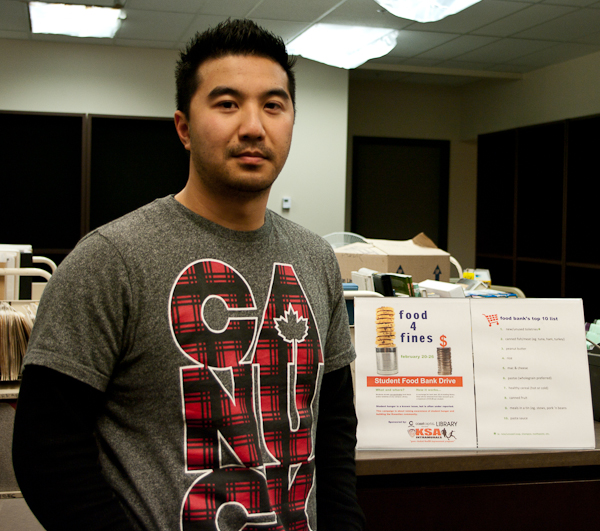
KSA Health & Recreation Manager, Eddie Lee, hopes the Food for Fines drive from Feb. 20-26 will give students incentive to donate to the food bank. Photo by Matt Law.
The KSA has partnered with the Kwantlen library to raise awareness about student hunger and generate donations for the KSA food bank.
“We wanted to provide incentive for them to donate. At the same time we wanted them to recognize that other students are in need and that they can really help and make a difference,” said Eddie Lee, KSA health and recreation manager.

A lack of donations have forced the KSA to spend students' money to fill the demands of the the food bank. (Photo by Matt Law.)
The Food for Fines program, Feb. 20-26, allows students to bring in non-perishable food items or new or unused toiletries to any campus library and receive $2 off fines for overdue items, up to a maximum of $10.
Lee got the idea from other universities that have had success with similar programs.
According to Lisa Hubick, public relations librarian, the library was happy to participate. She said the library had a history of helping local community food banks, but this was the first time they will be able to directly help out Kwantlen students.
While she admits that fines aren’t a huge problem with Kwantlen students, she hope students will take advantage of the Food for Fines program and help out fellow students.
Currently, the KSA food bank buys most of the food they need. According to Lee, they spend about $500 a semester on food bank supplies.
“The idea was to tug at the heart strings a little bit, as opposed to just doing a regular food drive,” Lee said of the program.
For more information on the food bank visit http://kwantlen.weebly.com/student-food-bank.html.
KSA providing Jitterbeans despite high levels of caffeine
February 14, 2011 by Josh Saggau · 1 Comment
Life as a student can be exhausting; homework and studying are enough to keep even the best students up all hours of the night.
But the KSA has your back. They’ve got Jitterbeans. The chocolate-coated espresso beans are now available, by the handful for just a dollar, in vending machines on campus.
Jitterbeans, made by Osmanium Candy Company, are usually sold in either 40 gram or 17 gram boxes but the KSA wants to make sure Jitterbeans are popular at Kwantlen before selling them on a large scale.
“Right now, it’s just the vending machines but if people like them and everything is okay we might look at other areas,” said KSA marketing coordinator Nathan Griffiths.
There could be a problem with large-scale selling of the beans though. Each 40 gram box of Jitterbeans contains roughly 600 mg of caffeine.
“That’s a lot of caffeine. Normally we wouldn’t stock a product like this for that reason but Jitterbeans has been so open and honest about the sheer quantity of caffeine that we thought that students were well informed… and could make the best decisions for themselves,” said Griffiths.
The Jitterbeans posters hanging on bulletin boards throughout the campus say the 600 mg of caffeine per box is equal to six cups of coffee or seven and a half cans of Redbull. They also have a disclaimer at the bottom warning students against eating more than one box per day.
Registered dietitian Natalie Brown echoed the Jitterbeans warning saying that even one box is probably too much. She said Health Canada recommends no more than 400 mg of caffeine per day and that it should be spread out over the course of the day.
“When we have a lot of caffeine at once, it can cause a lot of different things. The acute symptoms are it can cause nausea, vomiting, heart complications, gastro-intestinal upset and then, as well, when you consume a huge amount like that, 600 mg, all at one time, it’s really hard on your system. You could potentially cause yourself to have a heart arrhythmia. [People] actually could have heart attacks from having too much caffeine at one time so it’s very dangerous,” said Brown.
She also said that mixing Jitterbeans with alcohol would be even more dangerous. The high level of caffeine would make a person feel less drunk. She said that could lead to excessive drinking, and possible alcohol poisoning, or someone getting behind the wheel of a vehicle without realizing they are intoxicated.
“The alcohol in your blood is still the same but you’re not feeling the effects of it because of the caffeine keeping you stimulated. It’s a very dangerous combination to be dealing with.”
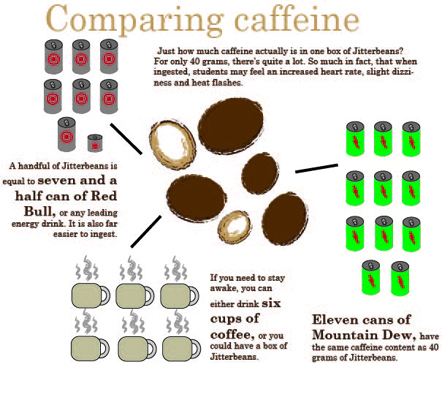
A comparison of the amount of caffeine found in Jitterbeans to other high-caffeine products. (Infographic by Hayley Woodin.)
Analysis: Looking at the MultiPass
February 4, 2011 by Stu Gallacher · Leave a Comment
Voting in the MultiPass referendum ends Sunday, Feb. 6, with students taking a long-awaited vote on cheaper transit.
Essentially, the Multipass combines the U-Pass, which provides unlimited access to public transit, with a few extra selling points. The U-Pass costs $30 per month, whereas the MultiPass costs $40 per month. The kicker: if the referendum passes, it will be mandatory for all students.
The break-down
With the MultiPass, students will be eligible to receive a membership to Gold’s Gym for $5 per month.
According the KUSA website, “The KSA is working to set up an exclusive express coach service that will rush you between Kwantlen campuses.” It says that this will be free for use with a MultiPass.
The KUSA website says, “Cars will be available on each Kwantlen campus for students to borrow…Your MultiPass gets you a more affordable membership into a car share program.”
Q & A with Matt Todd, KSA Director of External Affairs
Q: When can students expect to have a fully operational express coach service between Kwantlen campuses?
M.T: “The intention is to have it operating for May. The idea is that we want to have it started in the summer time so that we can test the service, try it out, and see how it goes.”
Q: When can students expect to have access to a car share service?
M.T: “We’re trying to put everything in place for May, but September for sure…the reality is that all of these services require really complicated contracts that require complicated negotiations.”
Q: Why Gold’s Gym?
M.T: “We tried three different groups for the gym pass, [but] in the end only one of them really fit our needs and gave us a great offer.”
Q: If the referendum ends in a no, when might Kwantlen get the U-Pass?
M.T: “It depends. There would have to be a conversation with the province and with Translink.”
Q: How soon or late could it be?
M.T: “That’s a good question…there’s a real possibility that if this fails, we would have to wait two years.”
KSA council divided on multipass
February 1, 2011 by Jeff Groat · 1 Comment
As students begin voting on a Multipass referendum this week, two members of the KSA council are concerned that the pro-Multipass position the KSA is taking is in conflict with the association’s duty to represent the student body.
Brad Head, the director of academic affairs, and Shanal Prasad, the director of finance, think the KSA should be taking the time to educate students not only about the benefits of the Multipass program but also of the downsides.
“In principle, should students vote on the U-pass? By all means, yes, they should decide if they want it or not,” said Prasad. “But the way it’s been brought up, I totally disagree with.”
Head agrees.
“I don’t think it’s a fair program, I think that we’re benefitting the minimal amount of students,” he said.
“We’re spending $5,000 to push the Multipass through. If students disagree with that, they are allowed a mere $250 dollars to do a ‘no’ campaign.”
Head thinks that the KSA should not be taking a stance on the issue of the Multipass. He thinks that a neutral stance would not only be more representative, but would also “allow for an informed vote, not a forced vote.”
Prasad asked, “Why would [the KSA] take a ‘yes’ position? You’re not really representing your membership.”
Matt Todd, the director of external affairs, has represented the KSA during Multipass negotiations with TransLink.
“The KSA’s job is to create programs and services that it thinks are in the best interest of students to help students make the best of their time to be successful,” he said.
“If we were to create a program and not believe that it’s a good program, that we believe students would want, then we would be doing a terrible job.”
As for the discrepancy in funding between the yes and no sides, Todd writes the idea of unfairness off, saying a no’ campaign hasn’t even been proposed.
“Nobody’s even come forward for $5, $250 or $5,000,” he said.
“If students were actually organizing against the Multipass and felt that this was unfair, then it would be a conversation worth having.”
He points out that the funding numbers aren’t set in stone and could change if need arose.
Prasad managed to stave off the Multipass referendum until March, but a student petition managed to return the vote to its original dates, coinciding with KSA elections. His intent was to take the time to make sure students at all four campuses had been given the facts about the Multipass proposal.
As it stands, Kwantlen students would pay the same $30 fee as other institutions in Metro Vancouver, but for lower levels of transit service that other institutions receive, he argues.
“If you’re getting a half-price bus pass, you’re getting a pretty kick-ass deal,” Todd said.
Todd doesn’t think that the service gap is any reason to vote against the Multipass. “You’re still getting a half-price U-pass,” he said.
Matt Todd says that if the Multipass passes in the referendum, the KSA will lobby the TransLink mayor’s council to increase funding for services in order to address the service gap.
On Friday, Jan. 28, a TransLink table was set up on Surrey campus to provide students with answers to any questions they may have had. According to TransLink, there are no existing plans to increase service to the neighbourhoods surrounding Kwantlen campuses until it can raise the money to pay for it.
Head and Prasad believe that Kwantlen students need to know that they aren’t getting the same service as, for example, students at UBC and SFU are getting.
Leadership Conference: More than learning to lead
January 30, 2011 by Hayley Woodin · 1 Comment
For $20 a piece, Kwantlen students paid to come in to university on Jan. 29 for a day full of speeches and workshops.
While some students may not think that attending the third annual Student Leadership Conference would be the ideal way to spend a Saturday, according to the opening keynote speaker Joel Hilchey, the eight hours worth of sessions and speakers provided students with valuable skills and opportunities.
“I think it’s a chance to connect with other students who are like-minded, and who are willing to think a little bit bigger about the world,” he said.
The university’s president Dr. David Atkinson spoke briefly to students before Hilchey gave his opening speech titled “Take The Risk!” Atkinson was a keynote speaker at the first two conferences.
Hilchey is a co-founder of The Beanstalk Project, an organization that empowers students to take on leadership roles within their schools and communities. He is also a member of the Canadian Associated of Professional Speakers. As a student, he didn’t attend many conferences, but recognized the importance of being involved.
“I think it’s probably different for everyone,” he said. “[But] of course people gain skills.”
As part of his presentation, Hilchey tested a willing (but nervous) student’s capability to overcome her fears. Andrea Danyluk bit the bullet and placed her hand on a fully-functioning mouse trap. The speaker said that conquering fear is the first hurdle students need to overcome. “They become aware of their own strengths and their own goals.” The conference gave students the chance to step outside of their comfort zones.
Students could choose between a wide variety of workshops, ranging from public speaking sessions to networking. Hilchey said not only are the classes beneficial, but in choosing which ones to attend, students begin to recognize in which areas they need improvement. “There’s value in the process of choosing what you want to do at that session,” he said.
“I think it’s special when you get a lot of people together, or even if it’s a smaller group. When people get together and kind of get outside of their daily routines, good things can happen,” he said. “I think I get the most meaning out of helping people connect with each other, because those connections are lasting.”
Kwantlen looks for greener pastures with farm school
January 30, 2011 by Jeffrey Yip · 1 Comment
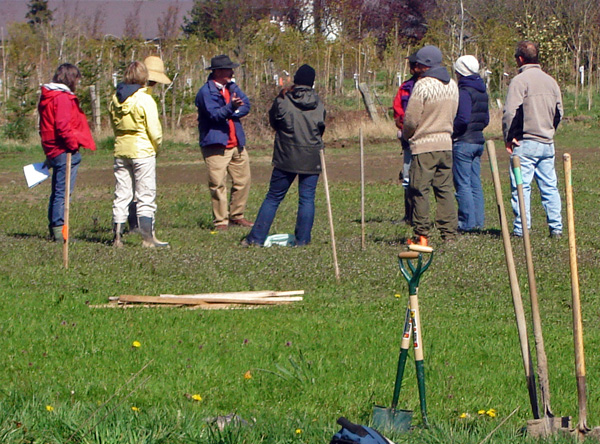
Kent Mullinix, director of the Richmond Farm School (centre dark blue jacket and orange sweater), explains orchard planning to students before they plant a pear orchard during the program's first year in 2010. (Photo by Mary Gazetas)
Old McDonald had a farm and so does Kwantlen.
On Feb. 3, the Institute for Sustainable Horticulture will launch the second year of its farm school. The Richmond farm school is an extension education program designed and intended to prepare people to “engage in local-scale, human-intensive” farming. And, according to the farm school director Kent Mullinix, this isn’t an ordinary university program. There are no textbooks, no assignments, no exams and no grades.
“It’s taught offsite and the whole school is in partnership with the City of Richmond. These are all unusual things for Kwantlen,” he said.
The program runs on a not-for-profit, cost-recovery basis: the farm school is completely funded by student fees and grants.
“We got a very generous grant from Vancity. They gave us $50,000, and with it we’re going to procure equipment and, most notably, we hired a farm school coordinator,” Mullinix said.
Anna Rallings is the program’s farm school coordinator and was a student in the program’s first class.
“I really liked working with chickens,” she said. “We built a chicken coop. And this year the new farm school students are going to be hatching chickens.”
Rallings, a graduate of environmental sciences, found that she didn’t like the day-to-day grind of sitting in an office and writing reports.
“I went into the farm school kind of with a blank slate, thinking that maybe one day I’ll farm. And now myself and another student, Charles Wilson, we’ve started our own farm, Natural Urban Growers in Richmond” she said.
The farm school isn’t just about teaching people how to farm.
“Folks of your generation need to understand that their lives are going to change radically. The fossil-fuel-based economy and lifestyle that you now live is going to cease,” Mullinix said.
“Virtually all of the students have already established careers and are fairly accomplished. They were in the farm school because they see sustainability as a preeminent issue.”
According to Mullinix, agriculture now “is absolutely unsustainable.”
The farm school’s goal is to change the way we farm and make it more sustainable. They’ve partnered with the City of Richmond and two Richmond NGOs to put in place various tools and demonstrations of what they call Municipal Enabled and Supported Agriculture or MESA.
“The farm school is a MESA tool,” Mullinix said. “Municipalities in the very near future are going to become very concerned with their agri-food systems, because it’s going to become inextricably linked to the sustainability of their community.
“If we can advance and achieve a sustainable agri-food system, then we can demonstrate to all that sustainability will enhance our lives not detract from them. If we don’t get this one figured out, we are in, as they say where I come from, a heap of trouble,” he said.
Rallings agrees and sees the farm school as an important step to making the world more sustainable.
“There’s a serious need for people to get into agriculture,” she said. “The nature of agriculture is changing because of climate change, but there’s also community development and the demand for local, organic food. The farm school’s really going to help bring people into the industry who might be on the outside and don’t know where they fit.”
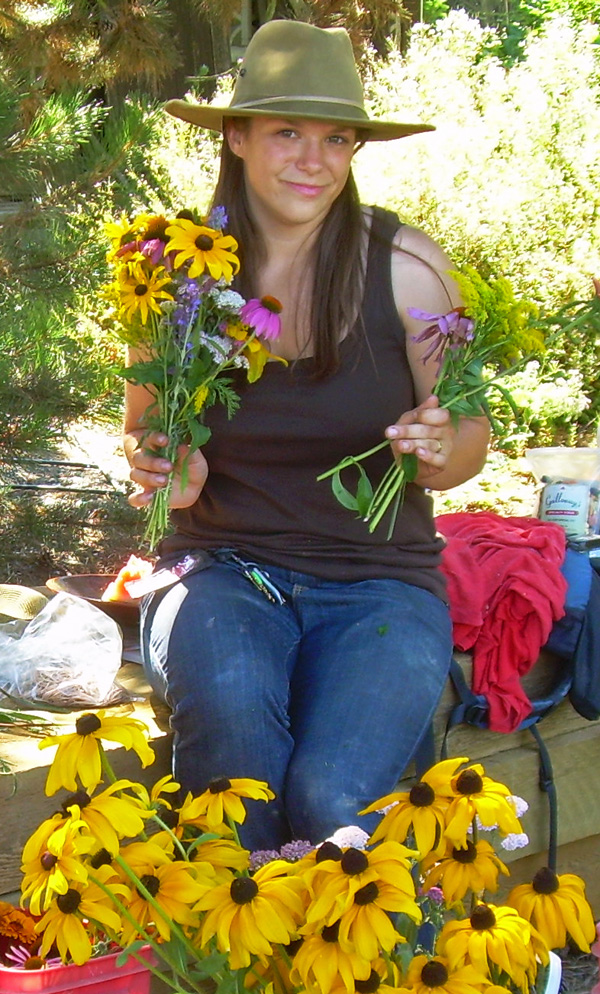
Anna Rallings prepares for the Steveston Farmer's Market during the first year of Kwantlen's Richmond Farm School in 2010. Following the program, she and a fellow student started their own farm, Natural Urban Growers, in Richmond. Rallings is also the farm school's coordinator. (Photo by Kimi Hendess)






